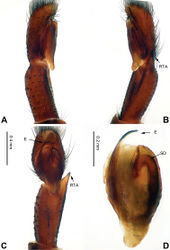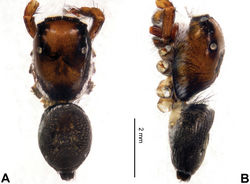Carrhotus sarahcrewsae
| Notice: | This page is derived from the original publication listed below, whose author(s) should always be credited. Further contributors may edit and improve the content of this page and, consequently, need to be credited as well (see page history). Any assessment of factual correctness requires a careful review of the original article as well as of subsequent contributions.
If you are uncertain whether your planned contribution is correct or not, we suggest that you use the associated discussion page instead of editing the page directly. This page should be cited as follows (rationale):
Citation formats to copy and paste
BibTeX: @article{Cao2016ZooKeys, RIS/ Endnote: TY - JOUR Wikipedia/ Citizendium: <ref name="Cao2016ZooKeys">{{Citation See also the citation download page at the journal. |
Ordo: Araneae
Familia: Salticidae
Genus: Carrhotus
Name
Carrhotus sarahcrewsae Cao & Li sp. n. – Wikispecies link – ZooBank link – Pensoft Profile
Type
Holotype ♂: CHINA, Yunnan, Mengla County, Menglun Town, 48 km landmark in Nature Reserve (21°38.853'N, 101°09.625'E, 1001 m), seasonal rainforest, 30 July 2012, Q. Zhao & Z. Chen leg.
Etymology
The new species is named after Dr Sarah Crews for her contribution to the study of the spider family Selenopidae; noun (name) in genitive case.
Diagnosis
The male resembles that of Carrhotus sannio (see Żabka 1985[1]: figs 63–65), but the length of the tibia is nearly equal to the cymbium (Fig. 11A) vs. 2/3 of the length of the cymbium in Carrhotus sannio, and the cymbium has no apical process (Fig. 11C). Compared to Carrhotus kevinlii sp. n., the bulb length is subequal to the cymbium vs. less than half the length, the embolus has no membrane and the angle between the RTA and tibia is early 20° vs. about 45° in Carrhotus kevinlii sp. n.
Description
Male (holotype).Total length 5.77, CL 2.97, CW 2.25, AL 2.80, AW 1.94. Eye measurements: AME 0.63, ALE 0.29, PME 0.05, PLE 0.25, AER 1.84, PER 1.70, EFL 1.64. Clypeus 0.25 high. Legs: I 8.22 (2.25, 1.40, 2.13, 1.64, 0.80); II 6.38 (1.96, 1.06, 1.48, 1.25, 0.63); III 6.44 (2.00, 1.00, 1.33, 1.30, 0.81); IV 6.47 (1.93, 1.00, 1.41, 1.34, 0.79).
Carapace dark brown, margin and area around eyes dark with white hairs (Fig. 12A). Chelicerae dark brown, with dense greyish hairs. Maxillae and labium dark brown, tips with dark setae. Sternum light brown. Abdomen dark grey with irregular beige patches. Venter and spinnerets dark greyish. Legs brown. Spination of leg I: femur d3-1-1; patella p0-1-0; tibia v2-2-2, p2-0-2, r2-0-2; metatarsus v2-0-2, p1-0-1, r1-0-1. Palp: tibia subequal to the length of cymbium. Cymbium with long, dark brown bristles. Tibial apophysis triangular (Fig. 11B). Bulb equal to the length of the cymbium. Embolus short, about 1/4 the length of the tegulum, bent (Fig. 11D). Female. Unknown.
Distribution
Known only from the type locality.
Original Description
- Cao, Q; Li, S; Żabka, M; 2016: The jumping spiders from Xishuangbanna, Yunnan, China (Araneae, Salticidae) ZooKeys, (630): 43-104. doi
Images
|
Other References
- ↑ Żabka M (1985) Systematic and zoogeographic study on the family Salticidae (Araneae) from Viet-Nam. Annales Zoologici, Warszawa 39: 197–485.


